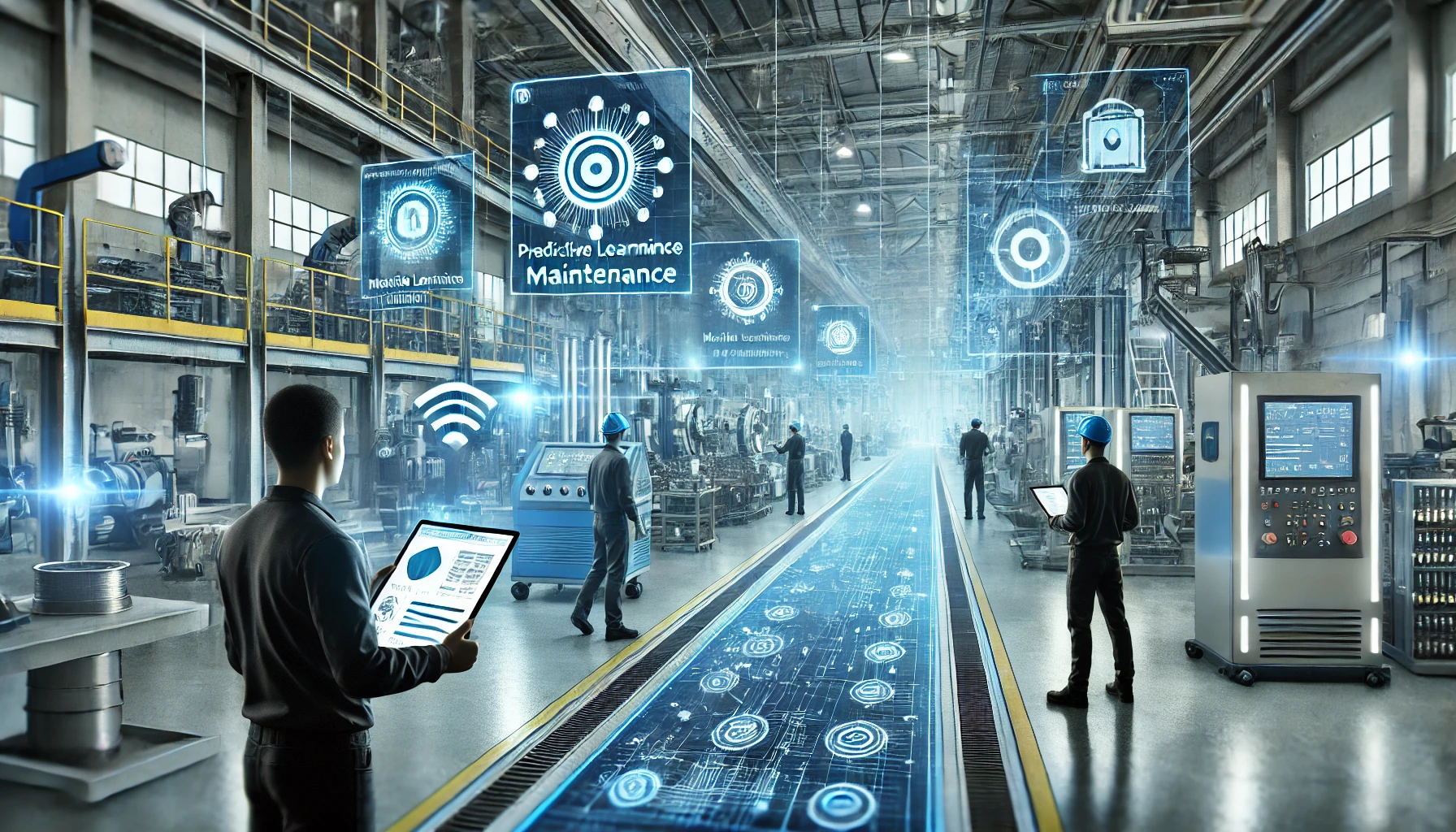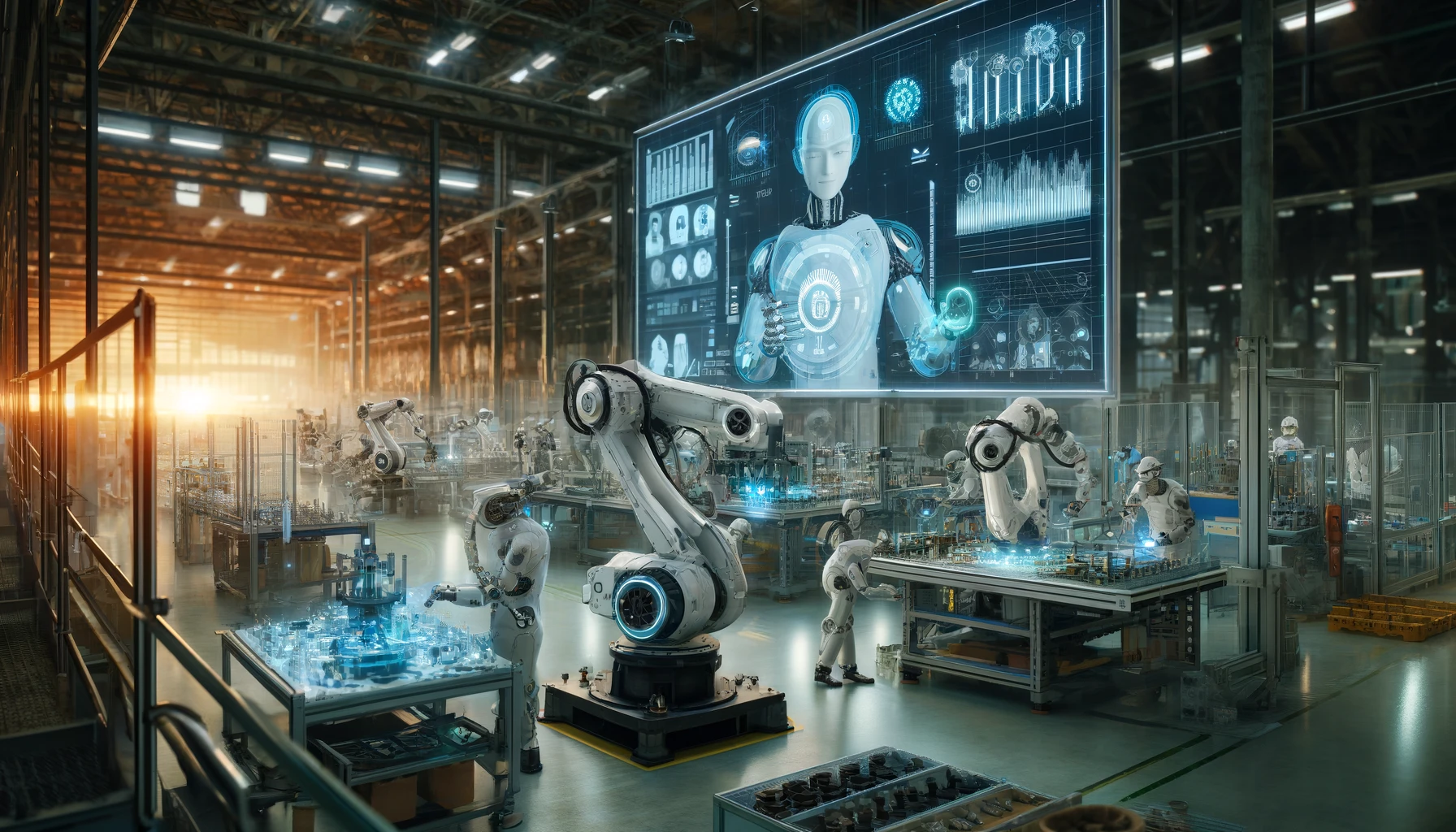
What is Machine Learning in Manufacturing?
Machine Learning in manufacturing involves using algorithms and statistical models to analyze data and make predictions. This technology helps manufacturers optimize processes, reduce costs, and improve production quality. Given the highly competitive nature of the manufacturing industry and its technical complexity – companies must constantly explore new technologies and stay abreast of new trends and opportunities in generative AI development and ML. By reading further, you’ll discover how ML can address common industry challenges and explore its top use cases in 2024. For instance, a McKinsey report reveals that AI could increase manufacturing productivity by up to 20%.
Benefits of Machine Learning in Manufacturing
Enhanced Predictive Maintenance
Machine learning algorithms can forecast equipment failures before they happen, providing an invaluable tool for businesses to reduce both downtime and maintenance expenses. By identifying potential issues early, companies can address them proactively, ensuring smoother operations and cost savings. A study by Deloitte revealed that implementing predictive maintenance strategies led to a 10% decrease in maintenance costs. This demonstrates the tangible benefits of using advanced analytics to improve operational efficiency and financial performance.
Improved Quality Control
ML systems detect defects and anomalies in real-time, ensuring higher quality products. According to a report by PwC, companies have observed a 35% improvement in defect detection by implementing ML. This advancement means fewer errors slip through the production process, leading to enhanced product reliability and customer satisfaction. Moreover, the continuous monitoring provided by these systems allows for immediate response and correction, minimizing downtime and production losses. As industries seek to optimize their operations, the adoption of ML for quality control is proving to be a game-changer, delivering tangible improvements in product standards.
Supply Chain Optimization
Machine Learning (ML) analyzes data to optimize supply chains, ensuring timely deliveries and reducing inventory costs. By leveraging predictive analytics and data-driven insights, ML helps companies make informed decisions about inventory management and logistics. According to a report by Accenture, companies that implemented ML experienced a 15% reduction in inventory costs. This improvement not only boosts efficiency but also enhances overall customer satisfaction by minimizing delays and out-of-stock situations.
Top 5 Use Сases of ML in Manufacturing
Predictive Maintenance
Predictive maintenance leverages machine learning to anticipate equipment breakdowns. By examining historical data, it forecasts potential malfunctions before they occur. For instance, General Electric employs this technology to oversee jet engines. This approach allows them to foresee and avert failures, resulting in substantial savings on maintenance expenses.
Quality Control
Machine learning (ML) systems are transforming the way we ensure product quality. By analyzing product images and sensor data, these systems can detect defects with remarkable precision. They identify anomalies as they occur, helping maintain high standards of product quality. For example, BMW employs ML technology to inspect car components, resulting in a 30% reduction in defect rates.
Supply Chain Management
Machine Learning (ML) enhances supply chain management by accurately predicting demand and efficiently managing inventory. By analyzing historical data and market trends, ML helps manufacturers align their production schedules with customer needs, minimizing the risks of overstocking or stockouts. A prime example is Amazon, which leverages ML algorithms to optimize its supply chain. This optimization leads to quicker delivery times and reduced operational costs, ensuring that customers receive their orders promptly and at a lower cost.
Production Process Optimization
In the realm of production, ML is a powerful tool for analyzing data and refining processes. By pinpointing inefficiencies and suggesting actionable improvements, ML enables manufacturers to boost their operational efficiency. Siemens, for instance, integrates ML into its factory operations, identifying bottlenecks and optimizing workflows. This approach has led to a notable 20% increase in production efficiency, demonstrating the tangible benefits of ML in industrial settings.
Energy Management
Energy management is another critical area where ML proves invaluable. By continuously monitoring and analyzing energy usage in manufacturing plants, ML helps companies reduce energy consumption and associated costs. Tesla’s Gigafactory is a standout example, where ML-driven energy management systems oversee the factory’s energy usage. This results in substantial cost savings and more sustainable manufacturing practices.
The Future of ML in Manufacturing
The future is filled with potential and exciting opportunities. As technology progresses, ML will play a more integral role in various manufacturing processes. This includes enhancing predictive maintenance, making supply chains smarter, and optimizing production lines to new levels of efficiency.
Leading companies, such as Bosch, are at the forefront of developing advanced ML systems specifically for manufacturing. These systems are designed to cut costs and boost efficiency, demonstrating the practical benefits of integrating ML into industrial operations.
The scope for growth in this sector is vast, with many experts forecasting widespread adoption of ML technologies in the near future. As these advancements continue, the manufacturing industry will see unprecedented improvements in precision, reliability, and overall performance.
Conclusion
Machine Learning is transforming the manufacturing industry. Its ability to predict maintenance, enhance quality control, optimize supply chains, and improve production processes is invaluable. As we move into 2024, the adoption of ML in manufacturing will continue to grow. If you’re looking for custom AI solutions to boost your manufacturing business, or advanced AI chatbot development to automate customer support, now is the time to act. Contact us to learn to hire machine learning engineers and know how we can help you stay ahead in this dynamic industry.
Frequently Asked Questions
- How is ML used in the manufacturing industry?
ML is used for predictive maintenance, quality control, supply chain management, production optimization, and energy management. - How does AI/ML in manufacturing make process plants more productive?
AI/ML increases productivity by predicting equipment failures, ensuring quality, optimizing supply chains, and streamlining production processes. - What are the real-life examples of machine learning in manufacturing processes?
Examples include General Electric’s predictive maintenance for jet engines, BMW’s quality control system, and Amazon’s supply chain optimization. - Why Does ML in Manufacturing Matter?
ML matters because it helps manufacturers reduce costs, improve quality, and enhance overall efficiency, leading to increased competitiveness.



